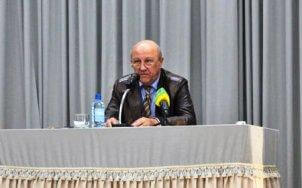
Andrey Fursov, a well-known historian and sociologist, gave a lecture on “The World Crisis” at the Yekaterinburg Diocese. He spoke about the underlying causes of the phenomenon of capitalism – economic, political and systemic.
In the conversation, the expert stated that the main threat to Russia is the loss of sovereignty, traditional values and civilizational code. The loss of sovereignty is manifested in the fact that we depend on Western banks and buy American bonds. Fursov’s lecture was devoted to the realities of capitalism, which invariably leads to crises. He appreciated the situation in Russia today – in his opinion, we are still “eating away” the legacy of the USSR, but in foreign policy there are already a number of steps towards independence:
“They are modest for now – this is Crimea, this is Syria. The steps are modest, but they are very different from how we surrendered our positions under the late Gorbachev and Yeltsin.”
In his lecture, Andrei Fursov tried to explain why it was the destruction of the USSR that became the trigger for the collapse of the capitalist system, which has nowhere else to spread. He spoke about the course “Three D” – deindustrialization, depopulation and derationalization of consciousness, which includes the environmental movement and the minority rights movement. He also explained how music was used to control large masses of people.
Crisis
The word “crisis” has become a code word for the modern era. We constantly talk about the crisis: about the financial crisis, about the education crisis, about the economic crisis. But it turns out that we have a crisis of everything. The crisis of everything is a systemic crisis. A crisis of what system? It is a crisis of modern society, a crisis of the market economy, a crisis of the industrial system. And at the same time we get by with one word – when we parted with Marxism after 1991, this word not only became indecent, not to mention abusive, but somehow it is avoided. The word is very simple – “capitalism”.
Unfortunately, since the late 1950s in the Soviet Union, capitalism has ceased to be seriously studied the way it was done in the Comintern times. In the late 1950s, we first began to translate Western communists, then leftists, then liberals, then we rolled down to neoliberals. And so they missed a whole series of important moments – they missed the formation of a new predatory faction of the bourgeoisie after the Second World War – the “corporatocracy”. The struggle between the corporatocracy and state-monopoly capital began in the West itself.
In the USA, this took a very acute form – it took the form of a creeping coup, which began with the assassination of Kennedy and the removal of Nixon as a result of impeachment, and by the mid-1970s the corporatocracy had firmly established itself in power. First, they brought a man unfit for power – Carter. But then Reagan came. And from that moment on, it was possible to launch a very serious offensive against the Soviet Union, especially since it had taken a defensive position – not a leap into the future, but a reaction to the situation. Especially since, apparently – this is my guess, I have no direct evidence – there was an exchange of a number of our technical areas in which we were ahead of the West. For example, in computer technology: The Politburo Resolution of 1968 and 1973 – that we will not develop computer technology – the subtext is “we will steal everything that is needed”. But at that moment we were ahead of the West by 10 years, and then we fell behind. What happened in exchange? In the late 60s, the projects of Soviet banks abroad began to become more active in the West. The transfer of funds from the nomenklatura to Western banks began. In other words, apparently, an “exchange” took place.
Capitalism is expansion
I do not agree with those who believe that the capitalist system is an absolute triumph. The capitalist system is a complex system that limits capital in its holistic and long-term interests, otherwise, if it is left to itself, it will eat itself, society and the biosphere. And secondly, it ensures expansion in space. That is, the capitalist system is what holds capital in space and time. When there is no space and time left, the capitalist system ceases to exist, but capital exists. They often say, well, why are you telling us again about the crisis of capitalism? They have been talking about the crisis of capitalism since Lenin, but capitalism still exists. Or, as our rebellious intelligentsia liked to say in Soviet times, returning from abroad, when asked “well, how is capitalism?” they answered: “It is rotting, but it smells great.” In fact, systems die longer than people. There are no eternal systems – systems are born, arise and die, and the crisis phase, the dying phase, lasts approximately 100-150 years.
Capitalism and anti-capitalism
By the end of the 19th century, there were more non-capitalist structures in the capitalist system than in the 16th and 17th centuries. In theory, it should be the other way around – capitalism created pre-capitalist forms on its own where it was not opposed by hired labor. For example, they came to the south of the United States when the USA did not yet exist, and to the Caribbean – they created plantation slavery there, which had not existed there before. They came to South America and created a quasi-feudal latifundium economy, they came to Bengal and created something like private property there, but without capitalism. Without capital. And it turns out that capitalism, unlike all social systems, creates other social systems on its own. This is the first thing. The second thing that is completely incomprehensible is that capitalism is the only system (I once wrote a lot about this in my work “The Bells of History”, 1996), which can exist with a “plus” sign and with a “minus” sign. And this “minus” is an indicator of the health of capitalism. “Minus” is systemic anti-capitalism, which Zinoviev called “real communism”, we call it socialism, the Soviet system, I prefer to talk about systemic anti-capitalism. That is, the “plus” sign and the “minus” sign.
Supranational groups for global coordination and management
There are two more things, two features of capitalism, which are very important for us now to understand the dynamics. First: under capitalism, supranational groups of global coordination and management arise – what Ivan Ilyin called “behind the scenes”, and what, as soon as you start talking about this, they brush it off as “ah… it’s a conspiracy theory”.
THE SECOND CIRCUIT OF POWER IN THE WEST AND CAPITALISM
There are all kinds of conspiracy theories. When you ask, “What do you mean by conspiracy theories?” a swim begins with cannonballs on their feet. Why should these groups exist under capitalism? The fact is that one of the basic contradictions of capitalism is that capitalism is an economically unified and integral world system, but politically it is a sum, not a whole. A sum of states – this has been the case since the Peace of Westphalia. The Westphalian system flowed into the Vienna, the Versailles, the Yalta. The Yalta did not grow into the Malta, but, for better or worse, the Westphalian system still exists in a broken form. And the world politically is still not a whole, but a sum. A contradiction arises at the level of politics-economics, state-capital, whole-sum. But the fact is that the bourgeoisie, especially the financial, especially the large one, has interests outside their states. And they can realize these interests only if they violate the laws of their state and a foreign state. The upper layer of the bourgeoisie has a historical need for organizations: a) supranational; b) closed (but not secret, then we would not know about them at all); c) long-term. At the moment when the bourgeoisie had this need at the end of the 17th, beginning of the 18th centuries, they did not have any of their own bourgeois structures. And then they – as the song goes “I molded him from what was” – began to look, and what is there? And there are Masonic organizations. And in 1717, the already existing lodges of England united and created the Grand Lodge of England. And then the development of these structures began. For some reason, we either demonize the Masons, or say that this is all nonsense, everything is wrong.
Freemasonry was the first closed structure, then new ones appeared, and one of the problems of the world capitalist elite is that those structures that emerged at the turn of the 1960s and 1970s to solve a number of problems, including strangling the Soviet Union in an embrace, have served their purpose, and new structures are needed. And how can new structures be created in a crisis? The house is burning, and I start making a stool? In other words, the presence of closed supranational structures of world coordination and management is the norm of capitalist development, its political economy. This does not mean that there were no closed structures before. The Templars were one and a half generations short of creating the first European Union, they had to wait for Hitler, the father of the European Union. But they didn’t create it, did they? Because they didn’t have a world market.
Capitalism ate itself in 400 years
Immanuel Wallerstein once said in a lecture, I wonder how we will remember capitalism in a thousand years? As a brief moment of a spurt, exponential growth in contrast to the asymptote of pre-capitalist development, or as something else? It is absolutely clear that capitalism is a historical conspiracy, it is a crime. But at the same time, capitalism is also fantastic inventions, a colossal population growth. Dismantling these institutions is the dismantling of the capitalist system. As soon as the world rate of profit in the capitalist system decreased, capitalism snatched a part of the non-capitalist zone and turned it into a capitalist periphery, solving the problem of cheap labor and a source of raw materials. In this regard, colonial expansion went in such spurts – now colonial expansion, then everything is quiet, it was connected with the world rate of profit. And what happens in 1991? That’s it, the non-capitalist zones are over. Capitalism can no longer develop extensively; there is nowhere to go, except into space.
CAPITALISM AS A REALITY – SOCIAL NATURE, MAIN STAGES OF DEVELOPMENT, MODERN WORLD CRISIS
What’s next – an excess of democracy in Western societies?
In 1973, the work “The Crisis of Democracy” was written (Huntington, Croisier and Watanuki), where it is written that the main problem, the main challenge and the danger of the West is not the Soviet Union. It is the excess of democracy in Western societies. It is necessary to remove this excess, it is necessary to apathize the population, especially active political groups, and instill in the population that democracy is not so much a value as a principle. But there are other principles – hierarchy. From this moment on, the process of dismantling many institutions that limit capital begins. The neoliberal revolution or counterrevolution with the faces of Reagan and Thatcher begins. But first, preparations had to be made for this. And this dismantling is the crisis.
The crisis did not begin in 2008, the crisis began at the turn of the 70s and 80s, when they began to remove what hinders capital. But it is precisely what hinders the capitalist system that makes it. Deindustrialization was invented in order to degrade the working class. Formally, it has an economic “excuse” – if we transfer the automobile industry from Detroit to South Korea – production will cost us less, South Korea has weak trade unions, we can pay people less. And we will show the workers of Detroit a fig – if you do not want to work for less money, then do not. The result is the bankruptcy of Detroit. But the main thing was that deindustrialization weakened the social force that could, ultimately, politically challenge the top. I call this course “Three D” – deindustrialization, depopulation and derationalization of consciousness.
Cut down the “cultural optimism” of the 1960-s
Deindustrialization had to be prepared. That is why in 1962 an environmental movement was created with Rockefeller money, which began to explain all the harmfulness of industrial development – it is bad from the point of view of ecology. Then the Club of Rome was created and in the very first report it was stated that “zero growth” is needed, that is, 50% for industrial development, 50% for leveling out environmental damage. In fact, it was about stopping technical progress. Note that at the turn of the 1960-1970s, space programs were curtailed, industrial development was curtailed, and the Tavistock Institute for the Study of Man was given the task of cutting off the “cultural optimism” of the 1960s. In what form did cultural optimism develop? In the form of science fiction. Since the late 1970s, it has been replaced by fantasy. How is fantasy different from science fiction? Fantasy is the future, like the past: these are dragons, these are lords, this is the world of magic. And this is a very important point. Magic power. Because magic is what opposes religion.
Music as a way to influence the masses
The expansion of English-language music begins. I really love the music of the 30-70s, and if you watch any disc, French and Italian music will dominate. From the mid-1970s, or more precisely with the Beatles phenomenon, completely different music begins. And it is very interesting – when it was necessary to launch the process of the revolution of 1968, rock music worked – 160 beats per minute. And therefore, when it was necessary to dampen it down, the disco style began, Italian music. And the disco style is exactly 72 beats per minute. This is a great psychophysical manipulation of large masses. In the 1960s, a youth subculture was created: “rock, sex, drugs”.
The environmental movement, the women’s movement. And, finally, the movement of sexual minorities. The movement of minorities is what undermines civil society. A minority is a collective. Civil society consists of individuals. Archaization began in this form. It doesn’t matter what kind of minority it is – ethnic, sexual, what matters is that it is the dominance of the collective over the individual. Europe is returning to the pre-capitalist past, and the entire system is returning to this past. True, the “dismantlers” had one problem – the USSR. The thing is that while the USSR existed, it was impossible to put pressure on its middle classes, it was impossible to put much pressure on the periphery. And it was necessary to somehow solve the Soviet problem – to strangle it in an embrace.




















